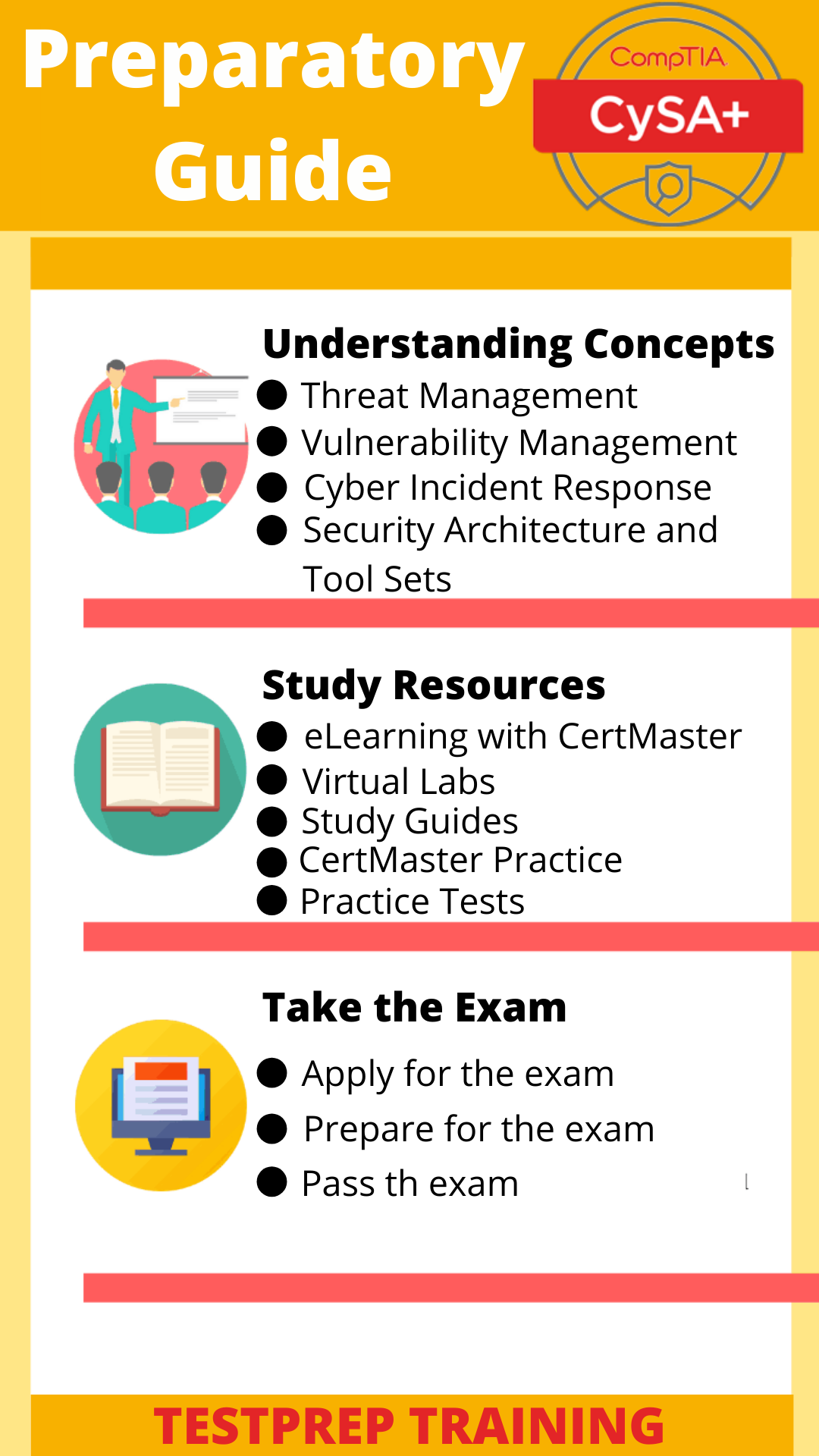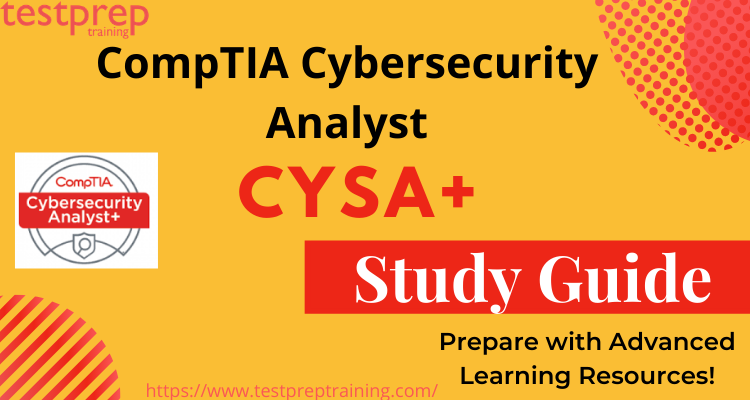The CompTIA Cybersecurity Analyst CySA+ (CS0-001) certification exam confirms that candidates can configure and operate threat detection tools effectively. It also assesses their capacity to analyze data, interpret findings, and spot weaknesses, threats, and risks in an organization. The ultimate aim is to enhance security and safeguard applications and systems within the organization. This exam is a significant challenge, and that’s why we offer a carefully crafted study guide to assist you in obtaining your CySA+ certification.
CompTIA Cybersecurity Analyst (CySA+) CS0-001 exam is retired on October 21, 2020. An update CompTIA Cybersecurity Analyst (CySA+) CS0-002 exam is available.
Recommended Experience: CySA+
- Firstly, Candidates should have sound knowledge of Network+, Security+ or equivalent knowledge.
- Secondly, Candidates should have a minimum of 3-4 years of experience in hands-on information security or related area.
CompTIA Study Guide
Getting certified for your knowledge and skills boosts your confidence and provides you with immense credibility. Preparation for an exam is one of the most essential yet difficult journeys. The secret to passing an exam is proper preparation. To prepare well, you need to stay committed and determined. There are plenty of resources available to help you get ready. You must have the correct information and tools to succeed on the exam. That’s why we offer our carefully designed study guide to assist you in earning the CompTIA Cybersecurity Analyst CySA+ certification.

Step 1- Understand the CySA+ Course Concepts
The first and foremost step is to have complete clarity about the exam course. You must familiarise yourself with all the 4 domains by referring the official site of Exam. Also gaining information about the exam guidelines is a must before commencing your preparations for the final exam. The exam objectives for NEW CompTIA CySA+ (CS0-003) include:
Security Operations (33%)
- Explain the importance of system and network architecture concepts in security operations.
- Given a scenario, analyze indicators of potentially malicious activity.
- Given a scenario, use appropriate tools or techniques to determine malicious activity.
- Compare and contrast threat-intelligence and threat-hunting concepts.
- Explain the importance of efficiency and process improvement in security operations.
Vulnerability Management (30%)
- Given a scenario, implement vulnerability scanning methods and concepts.
- Given a scenario, analyze output from vulnerability assessment tools.
- Given a scenario, analyze data to prioritize vulnerabilities.
- Given a scenario, recommend controls to mitigate attacks and software vulnerabilities.
- Explain concepts related to vulnerability response, handling, and management.
Incident Response and Management (20%)
- Explain concepts related to attack methodology frameworks.
- Given a scenario, perform incident response activities.
- Explain the preparation and post-incident activity phases of the incident management life cycle.
Reporting and Communication (17%)
- Explain the importance of vulnerability management reporting and communication.
- Explain the importance of incident response reporting and communication.
Step 2- Explore Study resources
There are many resources out there for the exam, but it’s important to make sure you use trustworthy and real ones. Here are some resources that come highly recommended for your preparation.
eLearning with CertMaster
CompTIA gives candidates to have access to the eLearning solution that is CertMaster Learn. CertMaster Learn is interactive and self-paced that includes a customizable learning plan and performance-based questions for CySA. However, this will help in taking you on a path of consistent learning toward your certification exam.
Virtual Labs
CompTIA Virtual Labs for Cybersecurity Analyst+ helps the candidate to acquire the necessary hands-on skills for the certification. Moreover, they will develop a deeper understanding of the subject matter and the practical aspects of the certification exam objectives. CompTIA Labs also helps candidates to address the practical aspects of Cybersecurity Analyst exam objectives and complement prior training through access to real equipment and software environments.
CertMaster Practice
CertMaster Practice is a tool that assesses your knowledge and exam readiness. This CertMaster Practice tool is filled with question-first design, real-time learning analytics, and content refreshers. Moreover, This will help candidates to prepare well by confirming strong areas and filling knowledge gaps in weak areas during studying.
Study Guides
While studying for the exam, it is good to prefer traditional textbook style learning, which is packed with informative and accessible content covering all Security exam objectives. This study guide will teach candidates the fundamental principles of installing and configuring cybersecurity controls and participating in incident response and risk mitigation.
Instructor-Led Training
For those looking for in-classroom or live online training, CompTIA provides best-in-class instructor-led training for both individuals and teams. These training sessions will help the candidates to understand the concepts more accurately in a short duration.
Step 3- Practice Tests
Practice tests are a crucial part of preparing for the exam. They help you figure out which areas you’re good at and where you need to improve. Time is important during the exam, and practicing with these tests can help you get better at answering questions quickly. It’s a good idea to start using practice tests after you’ve finished studying a whole topic because it can also serve as a review. Lets Start Practising Now!



